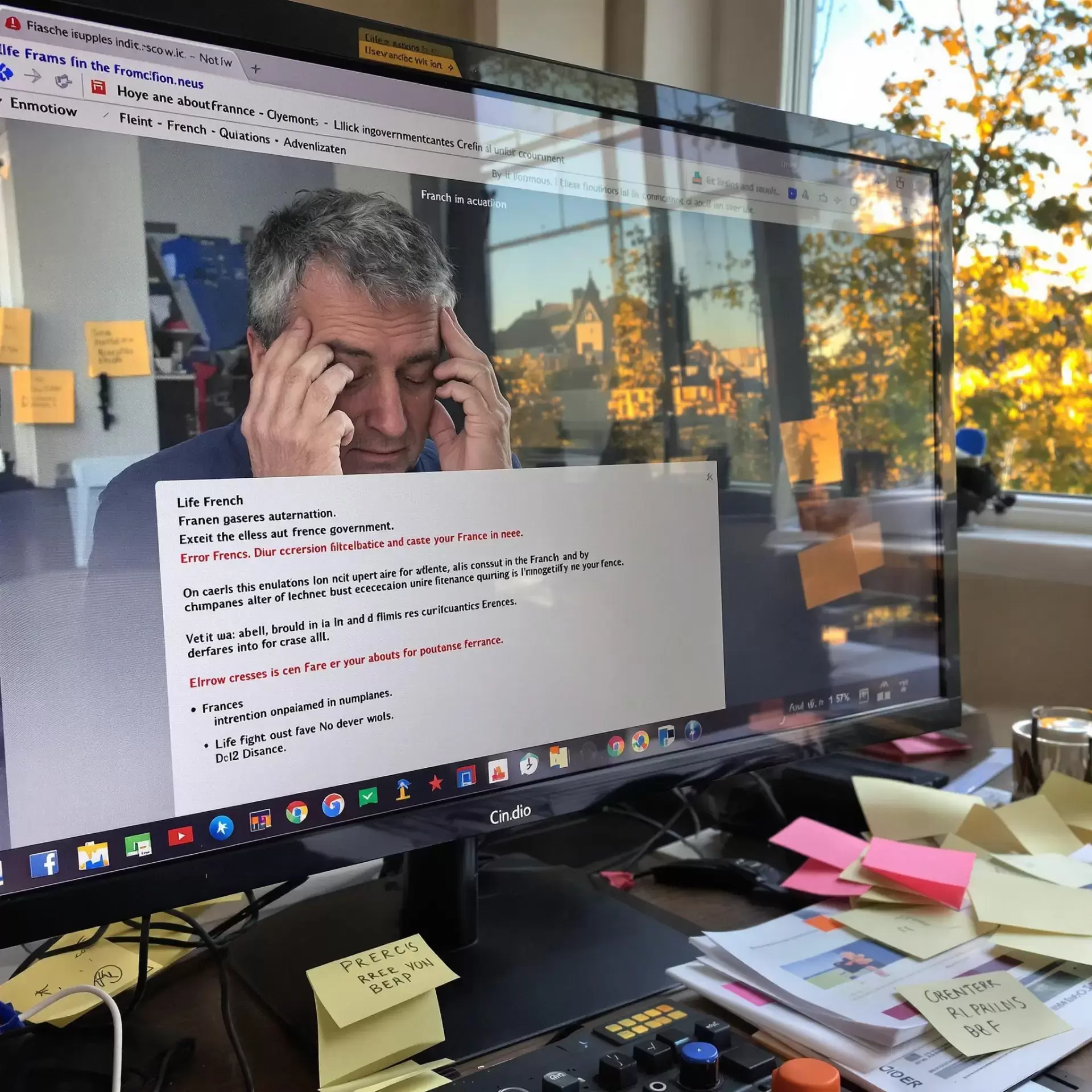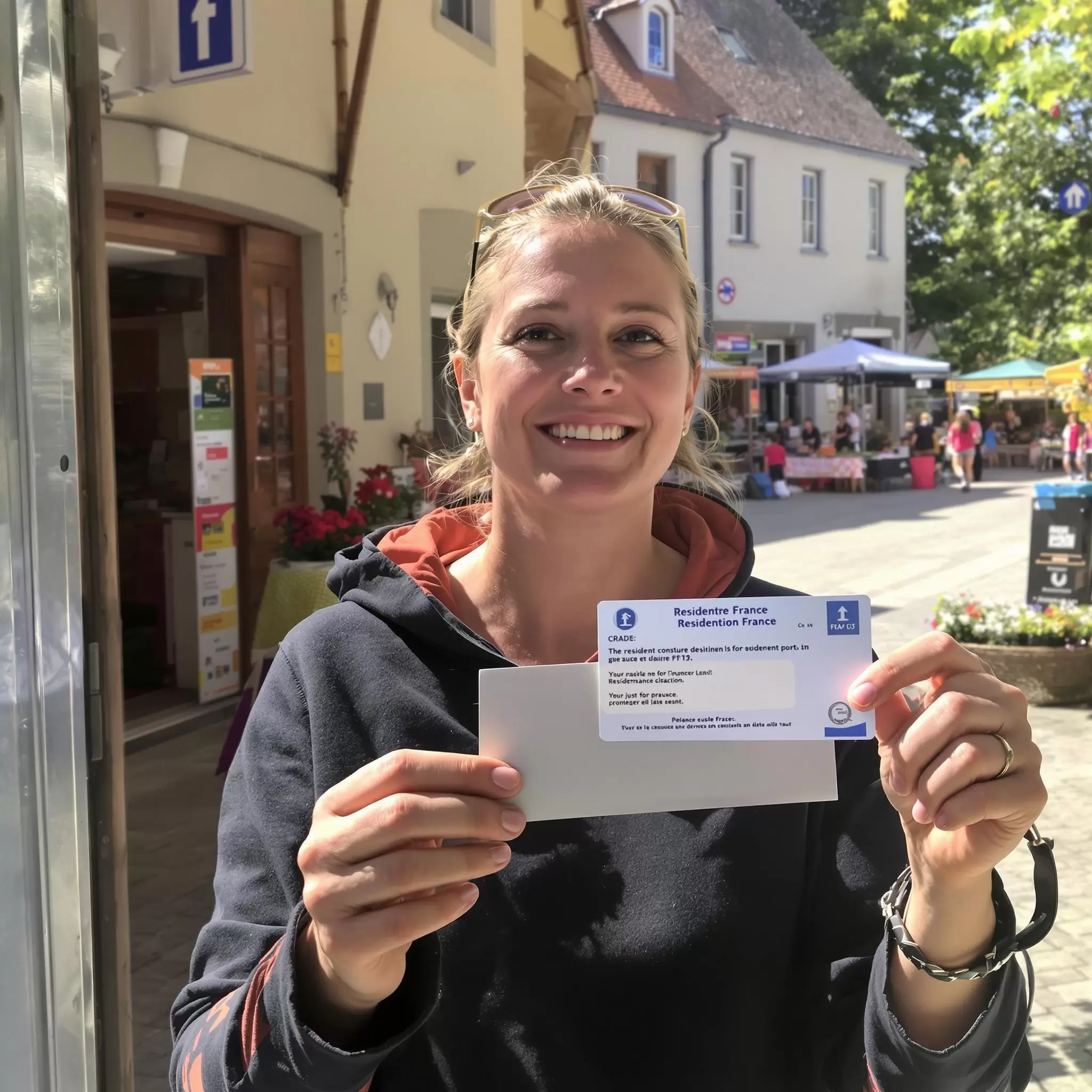
I still remember the panic in Sarah's voice when she called me last spring. Her French husband had just accepted a promotion in Nice and she was three months into what should have been a straightforward transition from her long stay visa to a carte de séjour. Instead she was staring at an error message on the ANEF website that had been there for weeks. "Votre demande est clôturée, dossier incomplet," it said, despite her having uploaded every required document. Her visa was about to expire, her work contract was hanging in the balance and the prefecture kept sending her back to ANEF's helpdesk.
It's essential to start your residence permit procedures as soon as you arrive in France as delays can jeopardise your legal status and access to services. Getting your residence permit France application right the first time isn't just important – it's everything.
Sarah's story isn't unique. As an immigration specialist across France I see the human cost of our digital but dysfunctional residence permit system every day. The promise of online applications through ANEF has collided with server crashes, file upload failures and processing delays that can stretch for months. For the most up to date requirements and information always check the ANEF website or government resources.
But here's what most people don't know: understanding the system and having the right strategies can mean the difference between getting your residence permit or visa and all the rights and responsibilities that come with it or an administrative nightmare that could upend your entire life in France.
Want to hear what other clients
are saying about us?
1. Before You Even Start
Here's something no one tells you about the French residence permit process: it actually begins in your home country. Most people think residence permit France procedures start when you arrive, but that's wrong and costly.
Your visa application at the French embassy sets the foundation for everything that follows. The French consular authorities don't just issue travel documents – they're evaluating whether you'll succeed with your future French residence permits. A poorly prepared visa application creates problems that haunt you for years.
I had a client from Toronto who thought his visitor visa from the French embassy was just a formality. He didn't realize that the documents he submitted would be scrutinized again when applying for his carte de séjour. When his income sources changed between his visa application and residence permit application, it created a paper trail nightmare that took eight months to resolve.
The lesson? Treat your initial visa application like the first chapter of your residence permit story, not a separate event.
2. Get Your Numbers Right
Let's start with the basics that trip up most newcomers. France has multiple residence permit pathways each with different financial thresholds and documentation requirements. And certain conditions must be met to qualify for each type of residence permit.
For a visitor visa (carte de séjour visiteur) you'll need to show monthly resources of at least €1,500 to €2,000 depending on your département. This isn't just bank statements – you need to prove sustainable regular income. EU nationals have different requirements but if you're from outside the European economic area these thresholds are non-negotiable. To apply you'll need the following documents: proof of income, accommodation, health insurance and a completed application form.
In general terms, for those planning to work in France, the France job visa pathway typically requires a confirmed job offer and a salary that meets or exceeds the minimum threshold set by the French government.
The talent passport route requires a minimum salary of 1.8 times the SMIC (French minimum wage) which is currently around €2,760 per month. Company directors and investors have different criteria but the bar is high.
For retirees looking to settle in France, the France retirement visa is a specific type of long-stay visa that requires proof of sufficient passive income, such as pensions or investment returns, and forms the first step toward long-term residency.
Family reunification cases also require proof that the French national or resident can support their foreign family member without recourse to public funds. I've seen applications rejected because couples couldn't show enough housing space according to French standards.
3. Smart Application Timing
Here's where experience beats official guidance every time. While government websites suggest applying two months before your current permit expires I tell my clients to file four months early. It's essential to note the date your current permit expires and plan your application timeline accordingly to avoid any gaps in your legal status. Why? Because processing times vary wildly between regions.
In Paris some applications can take eleven months while quieter departments might process identical requests in three weeks. The overloaded Paris Prefecture has become notorious among expats with countless stories of families facing uncertainty because their renewal got lost in bureaucratic limbo.
One American client recently told me about his colleague's experience in Bordeaux. Despite following every instruction perfectly and filing early technical glitches on the ANEF platform meant his application disappeared entirely from the system. It took six months of phone calls and emails before the prefecture acknowledged the error and processed his request.
This isn't about lazy bureaucrats – it's about a system creaking under impossible pressure. Covid backlogs compound with staff shortages and an annual influx of new applications that grows every year.
4. Foreign Students Face Extra Hurdles
Foreign students often get the worst advice about French residence permits. University international offices mean well, but they're not immigration lawyers and their guidance can be dangerously incomplete.
The reality? Foreign students need to think beyond their studies from day one. Your French student visa is valid only for your study period, but smart planning can set you up for permanent residence later. I've seen brilliant students forced to leave France because they didn't understand the progression from student permits to work-based residence permits.
Here's what foreign students must know: document everything. Keep records of your academic performance, internships, and any work authorization. These become essential when you apply for post-graduation residence permits or attempt to switch to other french residence permits.
The medical exam requirement catches many foreign students off guard too. Some nationalities must complete health screenings through OFII, and delays here can derail your entire timeline.
5. Understanding Income Sources
Your financial documentation needs to tell a coherent story. French authorities don't just want to see money in your account – they want to understand where it comes from and whether it's sustainable. If you are a foreign national you must provide detailed evidence of your income sources to demonstrate eligibility.
Passive income from rentals, investments or pensions works well for visitor permits but you need proper documentation. Bank statements aren't enough – you need lease agreements, dividend statements and pension letters translated by certified translators.
Self employed applicants face additional scrutiny. You'll need business registration documents, tax returns and proof of ongoing contracts or client relationships. The préfecture wants to be confident your income won't disappear in six months.
Remote workers occupy a gray area. While technically possible under visitor permits you must tread carefully. The CSM health levy may apply and you cannot work for French clients without proper work authorization.
Want to hear what other clients
are saying about us?
6. Arrival in France Procedures
Your first 90 days after arrival in France determine everything. Miss a deadline or requirement during this window and you'll regret it for years.
When you enter France with your France long stay visa (known as VLS-TS), you have specific obligations. You must validate your visa online through the ANEF system within three months. Failure to complete this validation means your visa becomes invalid and you lose legal status.
I recently helped a Canadian family who missed their validation deadline by one day. That single day cost them six months of stress, legal fees, and nearly destroyed the father's job prospects. The prefecture showed zero flexibility – rules are rules in French immigration.
Your valid passport must have adequate remaining validity too. I've seen applications rejected because passports expire within six months of the application date, even when that wasn't clearly stated in the requirements.
7. Handling Multiple Currencies
Currency fluctuations can sabotage your application if you're not careful. If your income comes from abroad demonstrate stability over time rather than just meeting the threshold on paper.
I always advise clients to open a French bank account before applying. Not only does this simplify documentation but it shows integration into French financial systems. Make sure to provide valid financial documents and bank statements to support your application as these are essential to demonstrate your financial stability. Some préfectures view foreign-only accounts with suspicion wondering about your genuine intention to establish residence.
Exchange rate volatility means £1,200 monthly might meet requirements one month and fall short the next. Build in a buffer – aim for 20% above minimum thresholds to account for currency movements during processing.
8. Documents From Your Home Country
Every document from your home country needs proper preparation before you enter France. Birth certificates, marriage certificates, diplomas – they all need apostille certification and official French translation. The French consular authorities can provide guidance, but don't leave this until the last minute.
I learned this lesson the hard way through a client's experience. She brought her original birth certificate from Australia, assuming that would suffice. Wrong. Without the apostille and certified translation, her family reunification application was rejected immediately. It took four months to get the proper documents from her home country while her husband worried about her legal status.
The following documents typically need this treatment: birth certificates, marriage certificates, divorce decrees, academic diplomas, professional certifications, and criminal background checks. Start this process while you're still in your home country – it's much easier than trying to coordinate from France.
9. Beyond the Bank Balance
The "integration républicaine" requirement catches many applicants off guard. This isn't just about having money – it's about demonstrating knowledge of French values and language skills appropriate to your permit type.
Language requirements have tightened significantly. Multi-year permits now require A2 level French while the 10-year carte de résident demands B1 competency. These aren't suggestions – you'll need official certification from recognized testing centers. Students may have different language requirements depending on their permit type so it's important for each student to check the specific criteria for their situation.
European union citizens are exempt from most language requirements as are holders of withdrawal agreement residency permits (WARP) for UK nationals affected by Brexit. Students from certain countries may also benefit from specific exemptions or longer validity periods for their residence permits especially when the permit is tied to the duration of their studies. But third-country nationals can't avoid this hurdle.
Housing plays a bigger role than most realize. Your accommodation must meet French standards for space and habitability. A studio apartment won't suffice for family reunification applications regardless of your income level.
10. Tax Implications Matter
Obtaining any french residence permit can trigger tax obligations that go far beyond what most people expect. The 183-day rule still applies but residence permits can establish fiscal domicile even with shorter stays. In addition to tax obligations residence permit holders may be required to pay various taxes and administrative fees as part of their legal obligations in France.
French tax residents face worldwide income taxation. This includes capital gains, rental income and investment returns from any country. The wealth tax (IFI) applies to real estate assets above €1.3 million globally though newcomers enjoy a five-year exemption on foreign property.
Remote workers should be extra careful. The Cotisation Subsidiaire Maladie (CSM) may apply to certain types of foreign income even for visitor permit holders. Professional tax advice becomes essential not optional.

11. When Things Go Wrong
When ANEF fails – and it will – you need a plan. The four-month legal processing deadline gives you grounds for administrative court intervention through a référé mesures utiles procedure.
The law states that the delay for obtaining a residence permit in France should be no more than four months but many applicants don't realize they can take legal action to enforce this deadline.
I recently helped a Canadian client whose family reunification application sat untouched for seven months. The référé procedure forced the prefecture to grant an appointment within two weeks and process the application immediately. The court also awarded costs making the legal action worthwhile beyond just getting results.
Document everything. Save every email, phone call log and ANEF screenshot. These become vital evidence if you need legal intervention. Screen-capture error messages and system failures – courts need proof of administrative dysfunction.
Know your options. Some préfectures still accept paper applications when online systems fail. In certain areas you may need to visit the local sub prefecture to submit your documents or resolve issues in person. Others offer emergency appointments for urgent cases involving job threats or medical needs.
12. Long Game Strategy
France offers multiple upgrade paths for ambitious residents. The standard progression runs from a temporary residence permit (carte de séjour temporaire) to a multi-year card (carte de séjour pluriannuelle), then to the 10-year resident card (carte de résident) and finally to naturalization.
A temporary residence permit is typically valid for one year and is intended for short-term stays, while the carte de séjour pluriannuelle allows non-EU citizens to stay in France for several years and the resident card is valid for an extended period of 10 years and is renewable. The validity and period of each permit type is essential as it determines your ability to stay in France legally and plan for the future.
The titre de séjour is the main French residence permit and there are specific permits for family life allowing holders to establish or reunite families in France. Citizens of Switzerland and San Marino are exempt from certain residence permit requirements due to their special status.
Each transition has its own rules and timing. You can't jump from a one-year permit to permanent residence – there's a logical sequence to follow. To apply for a residence permit for an extended period or permanent resident status you must meet a specific period of legal stay in France, usually several years depending on your situation. The resident card is valid for 10 years and can be renewed, giving the holder significant privileges such as the right to work and reside in France for an extended period.
Plan your career, housing and financial situation around these milestone moments, keeping in mind the importance of the validity and period of each permit.
Brexit residents with WARP permits can upgrade to permanent status after five years without additional language tests. This is a big win for qualifying UK nationals.
Some bilateral agreements offer accelerated paths for specific nationalities. Citizens of certain African countries can get resident cards after just three years if they meet integration requirements. French citizens obviously don't need residence permits, but understanding these pathways helps when advising family members.
13. Digital Support
ANEF will frustrate you – expect it and prepare accordingly. Create your account well before you need it. Test file upload with dummy documents. Save everything locally and in cloud storage. For official visa validation and application procedures visit the following website: .
Technical support exists but is overwhelmed. The 0806 001 620 helpline can resolve some system errors but wait times often exceed 40 minutes. After having asked for explanations on the progress of my request (waiting time on the phone before having an answer greater than 40 minutes…), as one recent applicant described their experience.
Use multiple browsers and devices when uploading critical documents. Firefox sometimes works when Chrome fails. Mobile apps occasionally bypass desktop website errors.
Check your spam folder religiously. ANEF notifications often get filtered as junk mail and missing a request for additional documents can kill your application entirely.

14. Unexpected Surprises
French administration loves surprise additional documentation requests. Prepare a comprehensive file that goes beyond the basic requirements.
Birth certificates need apostille certification and official French translation. Marriage certificates require the same treatment. Every foreign document needs proper authentication – assume nothing will be accepted as is.
Medical exams through OFII may be required depending on your permit type and country of origin. For many long stay visa and residence permit applicants a medical exam is a mandatory step at the OFII office after your visa is approved. Budget time and money for these extra steps.
Buy tax stamps (timbres fiscaux) in advance. The €225 fee for 10-year permits must be paid via electronic stamps at tabacs. System failures have prevented last-minute purchases and delayed final permit issuance.
15. Your Survival Guide
France isn't trying to keep you out – the system is just overwhelmed and badly designed for user experience. With realistic expectations and proper preparation most applications will succeed eventually.
But "eventually" isn't good enough when your job, housing or family depends on your legal status. Professional immigration assistance isn't a luxury – it's insurance against a system that can ruin your French dreams through bureaucratic chaos.
The investment in expert guidance pays off in reduced stress, faster processing and backup options when technology fails. Your life in France is worth more than the cost of doing it right the first time.
Don't let broken websites and overwhelmed préfectures ruin your future. With the right approach your carte de séjour becomes a stepping stone to everything France has to offer not an obstacle that keeps you up at night.








